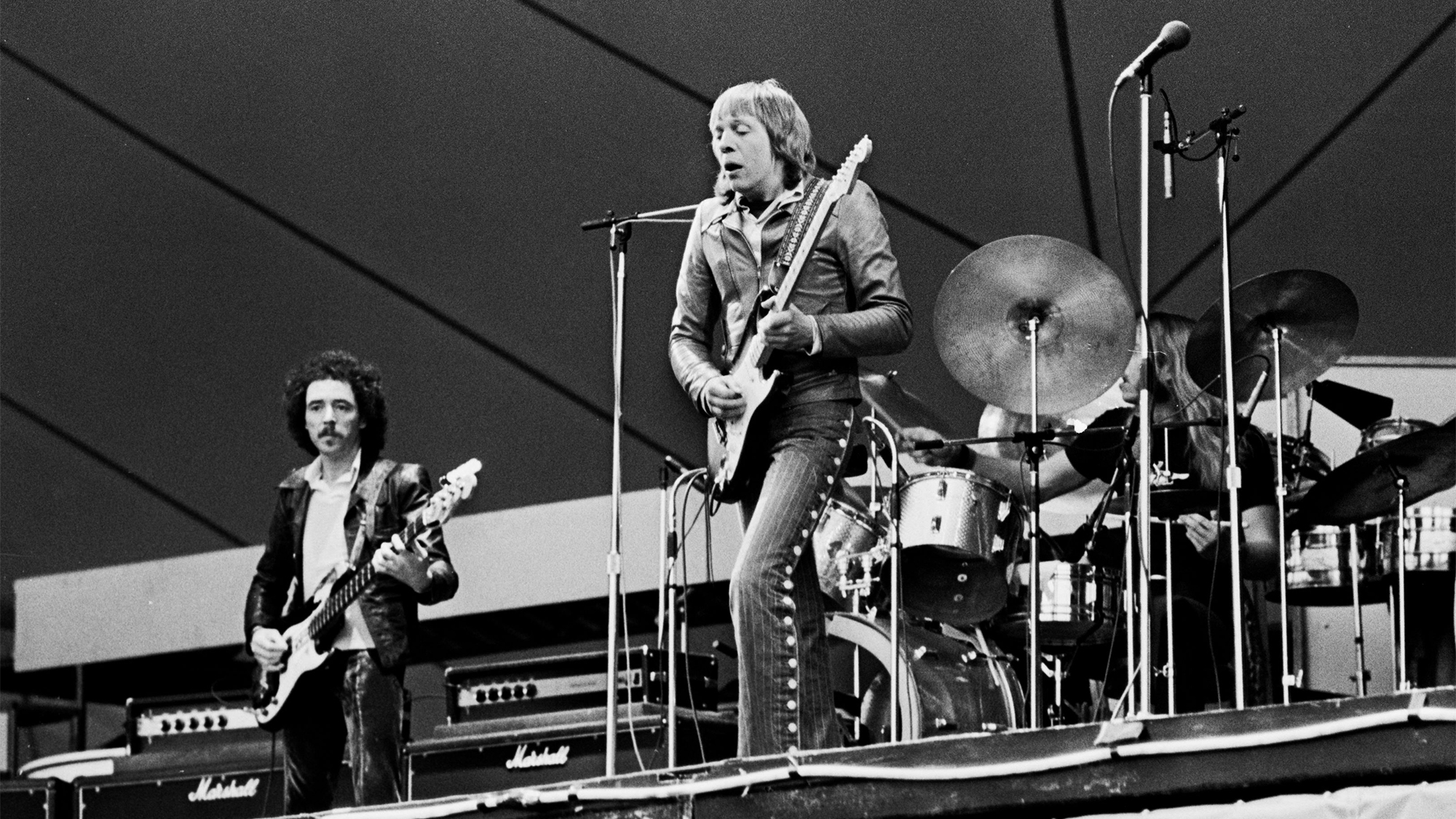"Without asking, I picked it up and plugged it into my amp. I thought, Yeah, I like that!" How Robin Trower got turned on to the Strat, courtesy of Jethro Tull's Martin Barre
The guitarist talks Strats and premieres an alternate version of "Alethea" from the forthcoming 50th anniversary deluxe edition of 'For Earth Below'

Robin Trower is, as we all know, a Fender Stratocaster aficionado and avid player — with the benefit of having his own signature model via the Fender Custom Shop.
But he is not particularly sentimental about his instruments.
Trower — who recently released a new album, Come and Find Me, and has a 50th anniversary deluxe edition of For Earth Below coming June 27 — was a Gibson user until 1971 when, in what's become a bit of legend, he and Procol Harum were on tour with Jethro Tull and he saw Martin Barre's Strat propped up against an amplifier.
"Without asking, I picked it up and plugged it into my amp, and that's when I thought, Ah...yeah, I like that," Trower tells us. "Almost the next day I went out and bought one...I think in one of the music shops on Charring Cross Road."
Trower doesn't recall the vintage, other than it was a 1960s model, and confesses that "I don't really remember the guitar very much now....That was a second-hand one; after that I started buying new ones. The ones I used on Bridge of Sighs, for instance, were all ’70s, new guitars."
Sadly, those and Trower's first Strat were part of a collection of guitars that were stolen from a storage locker he kept, including some other ’60s Strats, a vintage Telecaster, some Gibson models and a few acoustics.
"It was slowly done, one at a time," recalls Trower, who never found out who the thief was and never recovered any of the guitars. "After I said, 'No more vintage guitars. I'm gonna use all new ones."
All the latest guitar news, interviews, lessons, reviews, deals and more, direct to your inbox!

Nowadays those come from the Fender Custom Shop. Trower estimates he has "six or seven" of his signature models now, three of which are his "favorites." The alder-bodied guitars with a custom C-shaped maple neck feature custom pickups created by Trower and Fender's Todd Krause, using a reverse wound/reverse polarity middle pickup with a humbucking option — among other features.
"Obviously it's modified to my specs," Trower says. "I think in general the Strat has got a quite soulful tone, which I always relate to having a, like, human voice quality to it," he explains. "But there’s also, I think, a kind of liquidity to it you can get, which I like as well."
Being a Strat man has served Trower well, of course. At 80 — and despite health issues that forced him to cancel a planned U.S. tour last fall — he proclaims himself "tip-top... better than I ought to be for 80 years old," and maintains that his enthusiasm for playing remains undiminished.
"I think it's just the love of playing guitar," Trower says. "I pick up the guitar every day and play for my enjoyment. That's really where it all starts, and that's the sort of engine that drives the whole thing — the studio, the writing, the playing live. I'm blessed; I'm in good enough shape to still deliver the standard I demand of myself."
So good, in fact that Trower "just finished the next album," featuring material he wrote around the same time as Come and Find Me.
"I don't really have much of a thought process or control over the ideas I come up with," says Trower, who also played bass guitar on all but two of Come and Find Me's 11 tracks. Richard Watts remains his vocalist while Jess Hayes guests on the song "Tangled Love."
"I'll have an initial idea on the guitar — it might be only a riff — and then it's a natural progression to expand on it and try to turn it into a song. It always starts off with a guitar thing," although he says "Tangled Love" actually started off with the title, which is a rarity.

Trower says the solos on the new album were a combination of composed and improvised. The middle solo on "Come and Find Me" was "worked out beforehand," while others were arrived at through trial and error.
"When I'm writing a song I do fool around with the lead work ideas, just to get a feel for what would feel right," explains Trower, who begins a five-and-a-half-week U.S. tour on June 11 in Richmond, Virginia. "A lot of the songs are just jammed out, basically. I've got a round idea of what I want to do with it, but I just sort of go for it a lot of the time. I like to have that, 'cause I think you get a sense of the freedom of the playing, which connects on a more emotional level.
"On the earlier albums I just to jammed the solos much more. I wouldn't work out the ideas in advance, really. It was just sort of, I suppose, maybe a bit of overconfidence, but it was even more of a just go in and sort of go for it sort of thing."
Fans will have a chance to sample that on the For Earth Below anniversary release, a four-disc set that includes alternate takes from the 1975 follow-up to Bridge of Sighs — including a take 2 vocal of 'Alethea," premiering here, below — as well as new mixes and mastering and a wealth of live tracks, including TV and radio appearances and a March 1975 concert in Los Angeles. It went Gold as well and gave Trower his highest-charting album on the Billboard 200 (number five) and in his homeland (number 26).
"When I think back on it, it was quite a difficult album to make," Trower says of his third solo album, explaining that after making the "more relaxed" Bridge of Sighs in London he and his band moved to Los Angeles to make For Earth Below at the Record Plant there. There was also pressure to follow up Bridge of Sighs' Gold success.
"Listening to it more recently, there's some really strong stuff on there; the title track is something really special. I think it's better than I thought it was at the time, and the new mixes really enhance it a lot."
Gary Graff is an award-winning Detroit-based music journalist and author who writes for a variety of print, online and broadcast outlets. He has written and collaborated on books about Alice Cooper, Neil Young, Bob Seger, Bruce Springsteen and Rock 'n' Roll Myths. He's also the founding editor of the award-winning MusicHound Essential Album Guide series and of the new 501 Essential Albums series. Graff is also a co-founder and co-producer of the annual Detroit Music Awards.
![Robin Trower - Alethea (2025 Stereo Mix) [Official Audio] - YouTube](https://img.youtube.com/vi/rIM0PrEB33s/maxresdefault.jpg)

